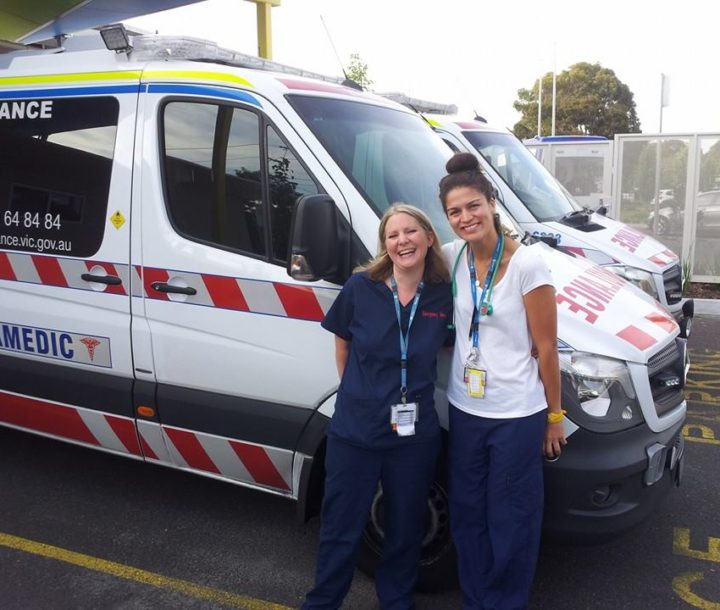Health professionals like Patricia Nayna Schwerdtle work in humanitarian contexts around the world, supporting people and communities through crisis. In a presentation for the Centre for Humanitarian Leadership, Trish shared her experiences working with Médecins Sans Frontières/Doctors Without Borders (MSF).
(This transcript has been edited for length and clarity.)
From Deakin to South Sudan
I started at Deakin University. I did a double degree in nursing and health promotion. I always wanted to work in humanitarian settings and realised that nurses and midwives provide the vast majority of health care worldwide and particularly in developing countries.
After that, I did a post-grad in critical care and gained experience in Emergency Departments in Melbourne before I went with Médecins Sans Frontières to South Sudan for a nine month field placement.
I was the ‘base nurse’ in a primary health care centre that was the sole provider of health care in the region. We had TB and antenatal care programs and a busy out patient department. I was responsible for the inpatient department including the therapeutic feeding center for malnourished children. We also ran an outreach clinic and a home based therapeutic feeding program.
South Sudan in the rainy season just turns into a massive swamp. You can’t really get in or out. When I was there we responded to a cholera outbreak, a measles outbreak, and a meningitis outbreak and coordinated some mass vaccination programs. I’ve never learned more in such a short period of time.
Working for a humanitarian organisation
MSF works in over 70 countries across the world. We have 446 projects, and our largest projects are in the Democratic Republic of Congo, South Sudan, Central African Republic, Yemen, Iraq and Syria. MSF also works in middle and high-income countries – like Italy and France where people (mainly refugees and asylum seekers) are excluded from health care.
MSF works in very diverse settings. So, when you go on an assignment with MSF, you might find yourself in a middle-income country in the Middle East, or a rural primary health care setting in the DRC. You don’t know where you will go and you can’t make specific requests because MSF operates on needs based humanitarian principles.
You might be able to explore the markets and enjoy the outdoors when you are not working. Or, you might be in the middle of nowhere where you really just have to make the most of where you are, enjoying the company of other staff, which is a great experience as well.
There is a great need for more career professional humanitarians, and that will only increase in the future. I hope more health professionals consider making that change.
Improving humanitarian health through research
Research is another way people can get involved in humanitarian action when they are not in the field. After South Sudan, I didn’t want to work clinically in ICU anymore. I was much more interested in public health, so I did a master’s in international health whilst working in emergency departments.
I’ve done some research in cholera: how effective cholera vaccination is as a reactive measure to outbreaks. I’ve done some qualitative research about people’s experience of Ebola and Ebola Treatment Centres. I’ve also done some secondary research on how mentorship in the training of health workers can improve the quality of care in developing countries.
Alongside research, I have been a Director on the board of MSF-Australia for 3 years. Governance is an important area of humanitarian work that is often overlooked. We are responsible for the organisation as a charity and ensure that we are compliant in the way we raise funds, use funds to deliver humanitarian assistance, and how we recruit and send humanitarian health workers to the field. We interact with boards throughout the international movement and build strategies on important issues like diversity and inclusion and climate change. MSF boards have to be comprised mainly of health professionals to ensure we retain our identity as a medical humanitarian organisation.
What humanitarian organisations are looking for
MSF needs general doctors, paediatric nurses, oncologist nurses, infection prevention control nurses, emergency doctors, midwives, paediatricians, palliative care doctors, anaesthetists, surgeons, obstetricians/gynaecologists, psychiatrists, neonatal and, and health promoters; I was really glad to see that job description come out in the last five years. MSF also employ epidemiologists, health worker trainers, anthropologists, pharmacists, medical scientists and psychologists.
And also logisticians – the medical work really depends on having the materials, shelter, water and energy that is supplied by technical and administrative logisticians. MSF also needs people with a background in finance and HR. So the profile from a recruitment perspective is very broad. Importantly, humanitarian work is becoming increasingly professionalised so MSF are looking to provide people with careers rather than just a one off opportunity.
Understanding humanitarian principles
When HR recruits people, they are looking for people that are committed to humanitarian principles, like neutrality, impartiality and independence in order to provide assistance to populations in distress, irrespective of race, religion, creed or political conviction. MSF may also choose to speak out when they witness extreme acts of violence or when access to life-saving medical care is hindered.
People know that MSF look after people on both sides of the conflict. MSF does not ask who’s right or wrong and they go where we’re needed.
MSF are looking for people that are committed to these principles, and understand them beyond the basic textbook kind of definitions. There is a great need for more professional humanitarians, that will only increase in the future. I hope more health professionals choose humanitarian health as a career.
[chl-cta-courses heading=”Ready to make a change?” interests=”GCHH”]The Graduate Certificate of Humanitarian Health will prepare you for a career in humanitarianism. Enter your email to receive the 2020 course flyer. [/chl-cta-courses]

